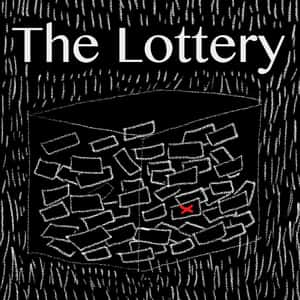Of all the unsettling short stories one might read in or out of school, such as “I Have No Mouth and I Must Scream,” “The Yellow Wallpaper,” or “The Furnished Room,” to give a few examples, “The Lottery” is one that seems to stick out the most to people. Why? Why is a stoning, an action we read of in the gospels with much less shock, so much worse than a cursed room or a world dictated by artificial intelligence?
For some context, “The Lottery” is a short story written by Shirley Jackson, and published in 1948. Jackson writes about one day in a small town: lottery day. All the families in the town gather at its center, and one by one the men of each family walk up to a black box and pick out pieces of paper. The man who drew the piece of paper with the black dot’s family would then have to pick a piece of paper out of the box. The family member who picks out the slip with the black dot is stoned to death by the rest of the village.
While it may seem like a relatively mild tale, it can be argued that it is stranger and slightly more disturbing than other short stories written in the mid-1900s, all based on the way it was written. To begin with, unlike the stories “I Have No Mouth and I Must Scream” and “The Yellow Wallpaper,” the narrator never once gives their opinion about the story, nor are they the main character. We can feel the rage and desperation of Gorrister in “I Have No Mouth and I Must Scream” as he faces AM because he has shared his past experiences with us. In “The Yellow Wallpaper,” we can be convinced that the narrator is the sane one as she crawls around the yellow room, finally free, because we have been there when she first came to the house with the yellow room, and have read her impressions of it up until the final sentence. However, there is no main character in “The Lottery;” simply a narrator picking up bits and pieces of commentary by the villagers, and unbiased descriptions of the day, the people, and the events going on. Instead of having an opinion formed for us by a main character’s experiences or context, we are thrown into a “clear and sunny” June day.
Another small key in “The Lottery” which makes it stand out is the lack of emotion, except what is necessary in the context of the story. In “I Have No Mouth and I Must Scream,” Gorristor almost happily doles out the disgust he feels toward his other companions, the rage he feels toward AM, and the pain he experiences from the torture AM designs for them. In “The Yellow Wallpaper,” it is hard not to be caught up in the excitement and interest that the narrator feels toward the woman in the wallpaper, and the logic of her increasingly crazy plans to free her. “The Lottery” lacks this emotion, which is easily tied together with the lack of opinion of the narrator throughout the whole story. The only emotion we can pick up from the story is nervousness, which becomes anxiety as the story climbs toward its end. However, Jackson writes the story with enough foreshadowing so that the end makes sense, but not enough emotion, so that the reader feels as if they are looking in on an event rather than partaking in it– and this is key for “The Lottery”.
Finally, arguably the most important factor about the “The Lottery” is the normality of what is taking place within it– the stoning. We have no clue as to why it happens– apart from old man Warner’s rhyme “lottery in June, corn be heavy soon.”– through which we only know that the stoning occurs in the latter part of June. Because of the lack of context from the story, and because none of the villagers are openly protesting the tradition, we as the readers are left feeling uneasy and horrified. In fact, it is not the plot and actions within the story itself that makes it so horrific to read– it is us, and our inexperience with the ceremony, that warps the day from an annual tradition into a joint homicide.
While it may seem like something so cruel as what occurs in “The Lottery” would not happen in real life, Jackson actually wrote the story to expose to the public their own brutish actions toward each other. In an interview, Jackson explained: “I suppose, I hoped, by setting a particularly brutish ancient rite in the present and in my own village to shock the story’s readers with a graphic dramatization of the pointless violence and general inhumanity in their own lives.” Her aim was not to write a horror story, but rather to open up the eyes of the public to their own “lotteries” they proceed with every day. By creating a setting where the characters view the lottery as normal, she sets the stage for our own world, and highlights how we deem inhumane practices and common, perhaps even blatant, violence (it is important to note the year this was written– 1948– and the end of World War II) as unavoidable or, even worse, necessary. While most will say they would never be able to commit such an awful act as murder, the next time you read “The Lottery” or hear someone mention it, think about what stones you might be carrying with you, and how you could have ignored their weight before, under the cover of normalization.






